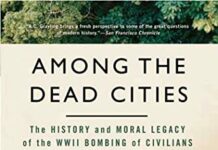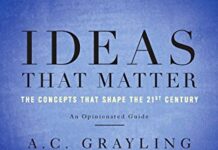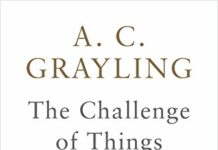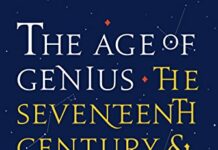
Ebook Info
- Published: 2019
- Number of pages: 704 pages
- Format: PDF
- File Size: 4.71 MB
- Authors: A. C. Grayling
Description
“A witty, learned, authoritative survey of philosophical thought.” —The New York Times Book ReviewThe first authoritative and accessible single-volume history of philosophy to cover both Western and Eastern traditions, from one of the world’s most eminent thinkers The story of philosophy is an epic tale, spanning civilizations and continents. It explores some of the most creative minds in history. But not since the long-popular classic by Bertrand Russell, A History of Western Philosophy, published in 1945, has there been a comprehensive and entertaining single-volume history of this great, intellectual, world-shaping journey. With characteristic clarity and elegance, A. C. Grayling takes the reader from the age of the Buddha, Confucius, and Socrates through Christianity’s capture of the European mind, from the Renaissance and Enlightenment on to Mill, Nietzsche, Sartre and, finally, philosophy today. Surveying in tandem the great philosophical traditions of India, China, and the Persian-Arabic world, and astonishing in its range and accessibility, Grayling’s The History of Philosophy is destined to be a landmark work.
User’s Reviews
Reviews from Amazon users which were colected at the time this book was published on the website:
⭐I’ll admit, the history of philosophy is one of my favorite genres, having read the works of Bertrand Russell, Will Durant, Anthony Kenny, Bryan Magee, Nigel Warburton, and others. Each has its pros and cons, so it’s hard to rank them, but if I had to, Russell’s The History of Western Philosophy and Magee’s Confessions of a Philosopher would top the list. (A Little History of Philosophy by Nigel Warburton would come in a close third, for those looking for a quicker read.)But now, if I had to recommend one book to someone interested in the subject, it would be A. C. Grayling’s latest, The History of Philosophy, and here’s why.For a single-volume work, this book has the most extensive coverage, not only because of its higher page count, but also because it packs the most content into each page. Grayling states in the introduction that his goal is to write about each philosopher as clearly and concisely as possible without sacrificing the complexity and subtlety of their thinking, which he masterfully achieves.Whereas Russell’s history only covers up to John Dewey, Grayling takes the reader through the entire twentieth century up to Kripke, and even manages to squeeze in a section on Indian, Chinese, Arabic-Persian, and African philosophy, in addition to an appendix on logic, all in roughly the same number of pages.How does he do this? Other than by writing clearly and concisely, unlike Russell, who spends 190 pages on Catholic philosophy, Grayling covers Medieval and Renaissance philosophy in 58 pages. Grayling’s principle of selection is more focused, as he makes the valid point that theology is not philosophy and that it requires its own history, much like science. As Grayling wrote, “if the starting point for reflection is the acceptance of religious doctrine, then the reflection that follows is theology, or theodicy, or exegesis, or casuistry, or apologetics, or hermeneutics, but it is not philosophy.” This allows him to dedicate more space to modern and contemporary philosophy.This is not to say that he ignores Medieval philosophy, just that he covers it in a rather brilliant way. Rather than focusing on the philosophical debates regarding imaginary entities (e.g., the nature of the holy trinity), he simply comments on the legitimate philosophical issues that “arise from or impinge upon” theological thought, i.e., the philosophical problems of time, free will, ethics, etc.In addition to more focused content, you might think that Grayling would have the edge on Russell for no other reason than the fact that his history was published 74 years after Russell’s, incorporating the latest research and progress in philosophy over the last three quarters of a century. But it’s not only for this reason.Russell’s account has been legitimately criticized for lacking objectivity and for providing inadequate or misleading coverage of several philosophers. Grayling’s history is an improvement in this regard, as it provides both a more objective and deeper account of each philosopher. Not that Grayling will escape the criticism of bias; for as Russell said, “a man without bias cannot write interesting history — if, indeed, such a man exists.”Grayling is not such a man, but this is a good thing. He does a commendable job of walking the fine line between the objective presentation of each philosopher’s ideas and the analysis and commentary that by definition must be biased toward a particular perspective. (A completely objective history of philosophy without commentary would be nothing other than a series of dull Wikipedia entries.) That said, I wouldn’t be surprised if Grayling is criticized for not hiding his atheism and contempt for religion, but, as he accurately noted, religion is most definitely not philosophy, for several reasons he makes perfectly clear.Last, I can confidently say that, out of the many works on popular philosophy I’ve read, Grayling provides the clearest accounts of the even the most difficult philosophers (Kant, Hegel, Heidegger). I came away from this book with a sense of greater understanding of the most challenging ideas thanks to what I’m sure was a tremendous amount of work that Grayling put in to make the ideas come to life for a non-philosopher (this is a majorly underrated skill).Grayling is simply a masterful writer, providing a clear, concise, and entertaining narrative of the deepest and most profound thinking in the history of our species, updated for the twenty-first century (a time in which we need philosophy more than ever). While I wouldn’t say that Grayling’s history replaces Russell’s (Russell is not replaceable), if you decide to read only one book about the history of philosophy, make it this one.
⭐Added to my library this excellent review of the world’s philosophies. Goodwill as a seller is EXCELLENT thank you for the great service. 5-Stars+++
⭐I am not a philosopher. I don’t belong to Mensa. But I love philosophy. So here’s my review for the ones like me: average Joes, hopelessly in love with philosophy.As others have said, this is a close contender for the best single volume history of philosophy. I felt that it succeeded in many areas except for two points.Successes:1. Grayling’s history is one of the best written of the various histories of philosophy that I’ve read – he has an expansive vocabulary, an engaging, active style and interesting asides and anecdotes without dipping into story-telling. The book is more readable than Kenny’s and Evans’ histories while avoiding strong opinions as in Russell’s and Durant’s histories. (Note that Russell’s is at times inaccurate).2. The book seriously attempts to cover all philosophy, not ”Western philosophy” but “Philosophy”. The coverage of non-western philosophy in the last section was a welcome and enjoyable read, though its entirely forgivable brevity and lack of depth makes me question whether a dedicated single-volume history of “Eastern” philosophy wouldn’t have been more appropriate. Though the book’s title hints at hubris, Grayling gets close enough to a full and meaningful overview of “Philosophy” without melting his wings.Failures1. While Grayling deftly explains the individuals and schools of philosophy, he does not center these around the central questions through history. For each era he relates how various philosophers riffed off their predecessors and related or not to their contemporaries and handed ideas on to their successors, I felt that he forgot the trunk for the branches. There is little ”bringing it back” to the big questions. I found myself struggling to understand why exactly the complex explanation of some philosophers or schools of thought even mattered. Maybe I wanted more philosophy than history. In my opinion, there is a much better discussion of “relevance” in Anthony Kenny’s somewhat larger history.2. The author, himself a well-known philosopher, stands in the Analytic tradition which provides a useful vantage point on the history of philosophy. However while the book seems to be written for the amateur, the chapter on Analytic philosophy felt dense and difficult. I’ve read numerous philosophical works and historical accounts that were difficult yet rewarding endeavors. After I slogged through the chapter on Analytic philosophy, I felt more confused in some respects than when I started. While I understand that this is Dr. Grayling’s “homeland”, perhaps he could have slowed down his tour a bit for the average reader.The lack of keeping the fundamental questions in plain view and the torturous chapter on Analytic philosophy, dropped it one-star for me.Nota Bene: The author makes his reasons for exclusion of theistic philosophy very clear. (Probably best expressed on pp 555-556.) Though I disagree with his premises, he states them upfront and recognizes that some will disagree. I can’t fault him for representing his beliefs. That said, I find his complete and unapologetic omission of Kierkegaard staggering. Even more so, some might argue, is his very brief and dismissive treatment of Aquinas. For an excellent history of philosophy which includes theistic philosophy (though of smaller scope and just slightly less engaging of a read), consider C. Stephen Evans’ history.
⭐The book is very comprehensive, well structured so you can easily find your way around and, most of all, readable for the interested layperson like myself, who wants to delve into this subject without having too much difficulty understanding of its subject matter.I shall update my review when I’ve completed reading the book.UPDATED REVIEW:Grayling’s History of PhilosophyI have now completed Anthony Grayling’s History of Philosophy and can truly say that it is a comprehensive and highly impressive work.It covers not only the history of western philosophy, as Bertand Russell’s book did over 70 years ago, but also philosophies from around the world, including India, China, Arabia and Africa. In addition, there are a number of specific chapters covering themes and developments in philosophy that bring the subject right up to date. Examples include Popper’s theory of falsification, the debate between Rawls and Nozick and various schools that have emerged in the twentieth-century, such as the movement in analytical philosophy and the existentialism of Sartre and Camus. Indeed, Grayling’s history covers just about everything.But apart from the sheer comprehensiveness of the book, Grayling gets the writing almost perfect; not too difficult, yet also not over simplified as one often gets these days with ‘mini-type’ histories of philosophy, offering no other than ‘snapshots’ of philosophers and their ideas that fail to bring the subject alive for the reader.Grayling says at the very beginning of the book that he read Russell’s History of Western Philosophy as a schoolboy and relished the clarity of its prose and wit. At the same time he recognised that it was not always accurate. What Grayling does, and does very well, is use Russell as a role model, whilst at the same time you feel you are in the hands of a more impartial writer giving a more accurate account of the philosophical landscape than you would be getting from Russell.Academics often scoff at Russell’s work but for the general reader his introduction to philosophy has remained supreme for a very long time. This is because Russell was a great writer and communicator. His chapter on Nietzsche is a case in point. Academics, perhaps rightly, may consider it rather shallow with not enough depth. Yet for the general reader the dialogue envisaged by Russell of an imaginary Buddha and Nietzsche stood before the Great Almighty arguing their respective corners is wonderfully done.However, Grayling has his own style and provides some wonderful anecdotes and asides along the way. Towards the end of the book we have the story between the duke and the bishop when discussing inferences in reasoning. His insertion of Shelley’s Ozymandias as he reflects on who will be remembered in one hundred years time in the philosophical world is beautifully done. And earlier in the volume, Grayling provides some wonderful anecdotes when writing about McTaggart, Bradley and Russell.In addition, Grayling’s work is much greater in scope than Russell’s. The sections on contemporary philosophers (eg, Husserl, Heidegger and Merleau-Ponty), philosophical movements (eg, Existentialism, logical positivism and virtue ethics) and world philosophies (China, India and Africa) are not covered in Russell’s earlier history. Indeed, compared to Russell — whose history ended with relatively short accounts of Bergson, the American pragmatists (James and Dewey) and a chapter on The Philosophy of Logical Analysis ― Grayling’s new history stands tall.The book is also structured particularly well. Starting at the beginning with the Presocratic philosophers, the book progresses through all the centuries and movements right up to modern times. It ends with two impressive small chapters: one that touches on the value of philosophy (Concluding Remarks) and a second that touches on common fallacies in reasoning (A Sketch of Logic). Both are very good.Grayling writes in his concluding remarks: “Philosophy is the refusal to be lazy about the great questions. It patrols the circumference of the little patch of light that is knowledge, looking out into the dark of ignorance to seek the shapes there.”I don’t think anyone having read the book could disagree with him.In short, it is refreshing to have a different philosopher, with a different voice, write about topics and ideas that are truly fascinating. Indeed, Grayling’s book has helped to consolidate my own knowledge on certain topics and furthered my understanding of the subject as a whole, to which I am grateful.I have read a few of Grayling’s other books but this one in my opinion is his greatest achievement so far. His other books I find more difficult and the writing a little too complicated, neither of which is the case with this volume. Indeed, if it doesn’t replace Russell’s work as the standard introduction to philosophy (a book that has stood the test of time for over 70 years), then it should certainly be read alongside it. Highly recommended.I hope you find my review helpful.
⭐Shame on you, Penguin Books! This paperback is just a reduced version of the hardback, such that the typeface cannot be easily read – I would guess it’s about 5 or 6-point.Combined with the thickness of the volume, which will not sit open at all, makes for an impossible read.
⭐I used the book ostensibly as a source for information and reference before I realised that I should have stayed with Scruton.This was a cheap and quite unnecessary replica. Perhaps, the word, ‘cheap’ is an exaggeration: since, it is both expensive and poorly produced.It is well-written but poorly conceived..
⭐I’m not academic, but I have read a few introductory books and also some more specific works on stoicism, logic, and existentialism. This book is comprehensive and beyond my understanding in its depth, yet, I am really enjoying it (50% through), and I think my prior intro reading has helped.
⭐A C Grayling is an excellent communicator and this book is very much to form. He writes in a way that is very easy to get along with but he does not over simplify. It is, in part, intended to replace books like Russell’s A history of western philosophy, which is somewhat out of date now and really quite opinionated. It is not so much a critical analysis of other philosophers, but more an explanation as to why they may matter.
Keywords
Free Download The History of Philosophy in PDF format
The History of Philosophy PDF Free Download
Download The History of Philosophy 2019 PDF Free
The History of Philosophy 2019 PDF Free Download
Download The History of Philosophy PDF
Free Download Ebook The History of Philosophy





